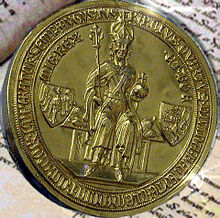Golden Bull of 1356: Difference between revisions
Appearance
Content deleted Content added
Tag: section blanking |
Tag: section blanking |
||
| Line 12: | Line 12: | ||
}} |
}} |
||
The '''Golden Bull of 1356''' was a decree issued by the ''[[Reichstag (Holy Roman Empire)|Reichstag]]'' assembly in [[Nuremberg]] and [[Metz]] headed by the [[House of Luxembourg|Luxembourg]] Emperor [[Charles IV, Holy Roman Emperor|Charles IV]] that fixed, for a period of more than four hundred years, important aspects of the [[constitution]]al structure of the [[Holy Roman Empire]]. It was named the ''[[Golden Bull]]'' for the golden seal it carried. |
The '''Golden Bull of 1356''' was a decree issued by the ''[[Reichstag (Holy Roman Empire)|Reichstag]]'' assembly in [[Nuremberg]] and [[Metz]] headed by the [[House of Luxembourg|Luxembourg]] Emperor [[Charles IV, Holy Roman Emperor|Charles IV]] that fixed, for a period of more than four hundred years, important aspects of the [[constitution]]al structure of the [[Holy Roman Empire]]. It was named the ''[[Golden Bull]]'' for the golden seal it carried. |
||
==Background== |
|||
According to the written text of the Golden Bull of 1356, "We have promulgated, decreed and recommended for ratification the subjoined laws for the purpose of cherishing unity among the electors, and of bringing about a unanimous election, and of closing all approach to the aforesaid detestable discord and to the various dangers which arise from it."<ref> Charles IV, Golden Bull of 1356. [http://avalon.law.yale.edu/medieval/golden.asp translated into English], Yale.</ref> After the long-time struggle of his predecessor [[Louis IV, Holy Roman Emperor|Louis IV]] with [[antiking]] [[Frederick the Fair]], Charles IV felt that it was necessary to change the current system of electing the "[[King of the Romans]]". He thought that without this new decree the world would never be rid of envious and ambitious politicians.<ref> Heer, Friedrich, trans. Janet Sondheimer, The Holy Roman Empire (New York: Federick A. Praeger Publishers, 1968), 117</ref> |
|||
The Golden Bull explicitly named the seven ''Kurfürsten'' or [[prince-elector]]s who were to choose the King of the Romans, who would then usually be crowned [[Holy Roman Emperor]] by the [[pope]] later. The seven prince-electors were, "Three prelates were archchancellors of Germany ([[Electorate of Mainz|Mainz]]), Gaul and Burgundy ([[Electorate of Trier|Trier]]), and Italy ([[Electorate of Cologne|Cologne]]) respectively : the [[Kingdom of Bohemia|Bohemia]] cupbearer, the [[Electorate of the Palatinate|Palsgrave]] seneschal, [[Electorate of Saxony|Saxony]] marshal, and [[Margraviate of Brandenburg|Brandenburg]] chamberlain."<ref name="Bryce"> Bryce, James, The Holy Roman Empire (London: The Macmillan Company, A New Edition, 1978), 243.</ref> Consequently, the Bull speaks of the ''{{lang|la|rex in imperatorem promovendus}}'', the "king to be promoted emperor" — although the distinction between the two titles would become increasingly irrelevant (and virtually nonexistent after [[Maximilian I, Holy Roman Emperor|Maximilian I]] had renounced his coronation as Emperor in 1508). |
|||
[[File:Goldene Bulle Handschrift.jpg|thumb|left|Page from the Golden Bull manuscript of King [[Wenceslaus, King of the Romans|Wenceslaus]], about 1400, [[Austrian National Library]]]] |
|||
Even though the practice of election had existed earlier and most of the dukes named in the Golden Bull were involved in the election, and although the practice had mostly been written down in an earlier document, the [[Declaration of Rhense]] from 1338, the Golden Bull was more precise in several ways. For one, the [[duke]]doms of the Electors were declared [[primogeniture|indivisible]], and succession was regulated for them to ensure that the votes would never split. Secondly, the Bull prescribed that four votes would always suffice to elect the new King; as a result, three Electors could no longer block the election, and the principle of [[Majority rule|majority]] voting was explicitly stated for the first time in the Empire. Finally, the Bull cemented a number of privileges for the ''Kurfürsten'' to confirm their elevated role in the Empire. It is therefore also a milestone in the establishment of largely independent states in the Empire, a process to be concluded only centuries later, notably with the 1648 [[Peace of Westphalia]]. |
|||
==References== |
==References== |
||
Revision as of 16:50, 31 January 2013
| Golden Bull of 1356 | |
|---|---|
 The golden seal that earned the decree the name | |
| Created | January 10, 1356 (chapters 1-23); December 25, 1356 (chapters 24-31) |
| Location | Austrian State Archives, Vienna (Bohemian and Mainz editions); Academic library of the Darmstadt University of Technology (Cologne edition); Bavarian State Archives, Munich (Electorate of the Palatinate edition and Nuremberg copy); Baden-Württemberg Main State Archives, Stuttgart (Trier edition); Frankfurt Institute for the History of the City (copy) |
| Author(s) | Delegates of the Reichstag held in Nuremberg and Metz |
| Purpose | Franchise of the seven Prince-electors voting for the King of the Romans |
The Golden Bull of 1356 was a decree issued by the Reichstag assembly in Nuremberg and Metz headed by the Luxembourg Emperor Charles IV that fixed, for a period of more than four hundred years, important aspects of the constitutional structure of the Holy Roman Empire. It was named the Golden Bull for the golden seal it carried.
References
External links
- The complete Golden Bull of 1356, translated into English.
- Selections from the Golden Bull from the Internet Mediæval Sourcebook at the Fordham University Centre for Mediæval Studies.
- The integral Golden Bull in Latin, comparative listing of all five initial copies.
Literature
- Bryce, James, The Holy Roman Empire (London: The Macmillan Company, A New Edition, 1978), 243.
- Chambers. D.S., Popes, Cardinals and War (London: I.B. Tauris, 2006), 28.
- Renouard, Yves, The Avignon Papacy 1305-1403 (Connecticut : Archon Books, 1970), 127.
- Heer, Friedrich, trans. Janet Sondheimer, The Holy Roman Empire (New York: Federick A. Praeger Publishers, 1968), 117.
